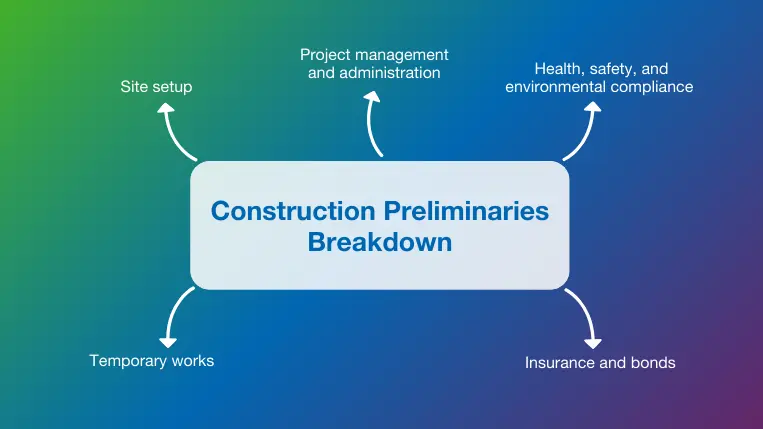Uncover the hidden costs of construction preliminaries that could make or break your project budget – essential knowledge for every UK builder and developer.
Understanding Construction Preliminaries: The Hidden Costs That Impact Your Budget
In the complex world of construction, preliminaries represent a crucial yet often overlooked aspect of project budgeting. These costs, which typically account for 10-15% of total project value in the UK construction sector, encompass all the indirect expenses necessary to facilitate the actual building work. Understanding these costs is vital for accurate project estimation and successful delivery, particularly as recent industry data shows that poor preliminary planning contributes to 23% of project overruns.
Defining Construction Preliminaries
Construction preliminaries encompass all necessary costs and activities required to establish, maintain, and manage a construction project that aren’t directly related to specific building works. These elements form the foundation of project delivery and include everything from site establishment to project completion procedures. In the UK construction industry, preliminaries are typically divided into fixed and time-related costs, with recent studies indicating they can represent between £15,000 to £50,000 per month for medium-sized projects.
Site Setup and Facilities
- Temporary site offices and welfare facilities
- Storage containers and material handling equipment
- Site security measures including CCTV and physical barriers
- Access roads and temporary parking arrangements
- Utility connections and temporary power supply
- First aid facilities and safety equipment
- Waste management systems and environmental protection measures
Project Management and Administration
Project management and administration form a substantial portion of preliminary costs, typically accounting for 3-5% of the total project value. This includes professional fees, documentation costs, and ongoing management expenses. Recent industry analysis shows that effective project management can reduce overall preliminary costs by up to 15% through efficient resource allocation and planning.
Key Components of Construction Preliminaries
Fixed Preliminaries
Fixed preliminaries represent one-time costs that remain constant regardless of project duration. These typically include:
- Initial site setup and mobilisation costs
- Planning and building regulation fees
- Insurance and bonds
- Health and safety documentation
- Quality assurance systems
- Site surveys and investigations
Time-Related Preliminaries
Time-related preliminaries fluctuate based on project duration and can significantly impact the overall budget. Current UK construction data indicates these costs average £2,500 to £7,500 per week for medium-sized projects, including:
- Site supervision and management staff costs
- Temporary accommodation rental
- Plant and equipment hire
- Ongoing utility costs
- Security personnel
- Regular site cleaning and maintenance
Calculating Preliminary Costs: A Practical Guide
Essential Cost Factors
When calculating preliminary costs, several key factors must be considered. Recent industry research shows that accurate preliminary cost estimation can reduce project overruns by up to 30%. Key considerations include:
- Project duration and complexity
- Site location and accessibility
- Local authority requirements
- Environmental considerations
- Security requirements
- Health and safety obligations
Common Pricing Methods
Different pricing methods are employed across the UK construction industry to calculate preliminaries. The most effective approach often depends on project size and complexity. Current best practices include percentage-based calculations, detailed cost build-ups, and hybrid methods that combine both approaches.
Managing and Optimising Preliminary Costs
Cost-Saving Strategies
Implementing effective cost-saving strategies can significantly reduce preliminary expenses. Recent industry data suggests that well-planned preliminary cost management can save up to 20% on overall preliminary costs. Key strategies include:
- Early planning and procurement
- Efficient site layout design
- Shared facilities arrangements
- Technology adoption for project management
- Regular cost monitoring and control
Risk Management
Effective risk management is crucial for controlling preliminary costs. Studies show that proactive risk management can reduce preliminary cost overruns by up to 25%. This includes identifying potential risks early, implementing mitigation strategies, and maintaining contingency funds.
Real-World Applications and Case Studies
Recent UK construction projects demonstrate varying approaches to preliminary cost management. For instance, a £5 million commercial development in Manchester achieved a 15% reduction in preliminary costs through innovative site layout and resource sharing arrangements. Similarly, a residential development in London saved £50,000 on preliminary costs by implementing digital project management solutions.
2024 Cost Guidelines and Industry Standards
Current industry standards for preliminary costs in 2024 show significant regional variations across the UK. London and the South East typically experience higher preliminary costs, with average rates 20-30% above the national average. Northern regions often benefit from lower preliminary costs, though this gap is narrowing due to increasing standardisation of construction practices.
Expert Tips for Effective Preliminary Planning
- Start preliminary planning early in the project lifecycle
- Conduct thorough site investigations
- Use digital tools for cost monitoring and control
- Maintain detailed records of all preliminary expenses
- Regular review and adjustment of preliminary arrangements
- Consider sustainable solutions to reduce ongoing costs
Final Thoughts: Mastering Construction Preliminaries
Understanding and effectively managing construction preliminaries is crucial for project success in today’s challenging construction environment. With preliminary costs typically representing 10-15% of total project value, careful planning and management can significantly impact overall project profitability. By implementing the strategies and insights outlined in this guide, construction professionals can better control these costs while ensuring project quality and compliance with all necessary regulations.
FAQ
What are the two categories of preliminary practices?
In general the preliminary practices are divided into two sections or kinds: the first are the common or ordinary kind of preliminary practices, and the second are the special or extraordinary kind of preliminaries.
What are the four great treatises on the preliminary practices?
The Four Preliminaries of the True Buddha Tantra are: the Great Homage, the Mandala Offering, the Fourfold Refuge, and the Vajrasattva Practice.
Was Padmasambhava a real person?
Guru Padmasambhava was known in Tibet as one of the founding fathers of Tibetan Buddhism, who appeared in Tibet in 749 A.D, and spent 54 years. Other two founders were Acharya Shanta Rakshita and prevalent King Thisong Deotsen. Padmasambhava’s birth in this world was mixed with myth and legend.
What are the 4 common preliminaries?
The common preliminaries consist of contemplating and meditating on four different topics: (1) the difficulty of acquiring this life with its opportunities and resources, (2) death and impermanence, (3) karmic cause and effect, and (4) the faults of saṃsāra.
What percentage of a construction project is preliminaries?
Preliminary percentage costs can start as low as 5 percent and rise above 15 percent, depending on the unique demands of the construction job you’re working.
Sources
[1] https://www.rib-software.com/en/blogs/preliminaries-in-construction
[2] https://www.designingbuildings.co.uk/wiki/Preliminaries%20in%20construction
[3] https://neuroject.com/preliminaries-in-construction/


Leave a Reply